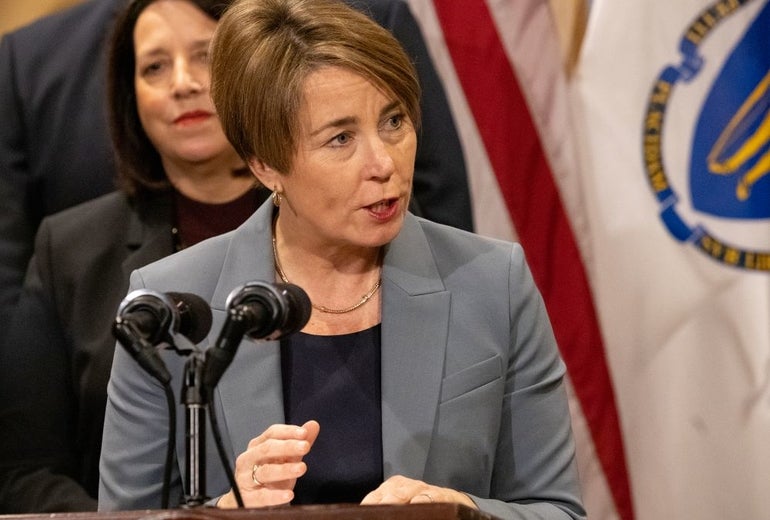The Healey administration on Wednesday rolled out its refreshed roster for the Department of Public Utilities and charged the new trio with creating a “21st Century DPU.”
Energy and Environmental Affairs Secretary Rebecca Tepper appointed Jamie Van Nostrand, a West Virginia University College of Law professor who has worked as a utility regulator, lawyer for energy companies and as the head of an environmental group, to serve as chair of the DPU.
Tepper also appointed Staci Rubin, a longtime environmental justice advocate who most recently worked as vice president of environmental justice at the Conservation Law Foundation, as a DPU commissioner and announced that Acting Chair Cecile Fraser, an energy and utilities industry attorney first appointed to the DPU in 2017 by Gov. Charlie Baker’s administration, will stay on as a commissioner at DPU.
“With Jamie, Staci, and Cecile at the helm, the next era of the Department of Utilities will be marked by a commitment to transparency, equity, and innovation,” Tepper said. “Our goal is to build a 21st century DPU rooted in these values. Jamie is a longtime advocate for the clean energy resources and will help lead the Commonwealth’s transition at this pivotal time. Staci has been at the forefront of the environmental justice movement in Massachusetts. And Cecile brings extensive institutional knowledge and a strong understanding of the importance of consumer protections.”
The DPU sits right in the middle of a number of issues that the Healey administration hopes to address: it oversees investor-owned electricity, natural gas and water utilities in Massachusetts, is charged with oversight of the safety of natural gas pipelines through the state, and regulates the safety of bus companies, moving companies, transportation network companies, and the MBTA.
Some of Healey’s significant commitments to the public — making progress towards Massachusetts being a net-zero emissions state by 2050, her promise to achieve 100 percent clean electricity supply by 2030, and her pledge to ensure the safety of public transportation — will require DPU involvement.
“For the past eight years, our team in the Attorney General’s Office, including Secretary Tepper and [Climate] Chief [Melissa] Hoffer, served as the ratepayer advocate by standing up for Massachusetts residents struggling to pay their utility bills,” Healey said. “We know how critical it is that the DPU leadership understands that the transition to a clean energy economy is a pocketbook issue and will be thoughtful in how we evolve our grid and economy for the future. I have full faith in Jamie Van Nostrand, Staci Rubin, and Cecile Fraser to uphold those values.”
The DPU has been operating with just two commissioners — Fraser and Commissioner Robert Hayden — since former chair Matt Nelson stepped down on Jan. 27. Hayden will step down from the DPU on April 8, the Healey administration said, and Rubin will start her new job on April 10. Fraser will continue to serve as acting chair until May 1, when Van Nostrand will start.
The Healey administration said its plan for “transforming the DPU” involves encouraging the commissioners to consider structural and cultural changes that would advance the goals of “facilitating rapid renewable energy growth, building a modern grid, and promoting resiliency,” establishing more meaningful engagement with and accessibility to the public, integrating equity and environmental justice considerations into all decision-making, and bulking up the agency’s expertise “to ensure DPU independence and meet its mission, which includes prioritizing affordability, consumer protection, emissions reductions, transportation safety, and more.”
Since 2011, Van Nostrand has been a professor in West Virginia and directed the school’s Center for Energy and Sustainable Development. Before that, he spent three years at the Pace University Elisabeth Haub School of Law serving as executive director of the Pace Energy and Climate Center and spent 22 years at two large firms in the Pacific Northwest – Perkins Coie LLP and Stoel Rives LLP.
The website for his 2022 book “The Coal Trap: How West Virginia Was Left Behind in the Clean Energy Revolution” said that Van Nostrand “grew up in Iowa as the son of the state’s chief utility regulator and energy advisor to a very popular governor.”
“I look forward to working with Secretary Tepper and the other energy and environmental agencies to meet Governor Healey’s clean energy objectives, while maintaining affordable energy and designing clean energy programs that benefit all communities,” he said in a statement.
Karan May from the Sierra Club in Central Appalachia said that Van Nostrand has been a “strong advocate” for West Virginia ratepayers since he arrived in the state in 2011 and that his familiarity with the ratemaking process made him an effective critic of pro-coal policies.
“His departure from West Virginia is a huge loss for us, but Massachusetts will be gaining an effective and knowledgeable expert as its chief utility regulator,” May said.
Rubin is already well-known on Beacon Hill from her time with CLF and her appointment as a DPU commissioner marks her return to the department. She previously worked at DPU as senior counsel and hearing officer, and the Healey administration said her first DPU tenure included leading the adjudication of a solar incentive program, implementation of multiple net metering laws, and managing the department’s public records team. She also has experience as senior attorney and environmental justice legal services program director at Alternatives for Community & Environment.
Before she was tapped as a commissioner in 2017, Fraser worked at the DPU as counsel in the Division of Regional and Federal Affairs and the Consumer Division. In that role, she focused on the New England wholesale electric markets and transmission system, as well as consumer issues. Before joining DPU, Fraser worked in private law practice and as an in-house counsel dealing with utility rates and regulation, infrastructure siting, and consumer service issues.

